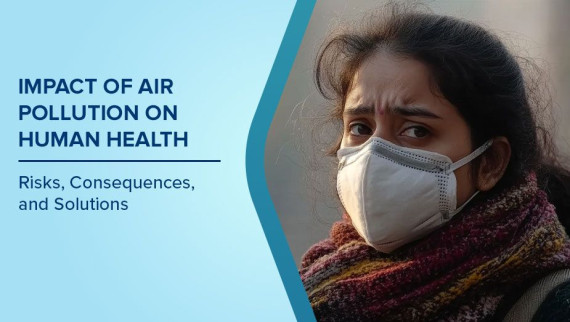Impact of Air Pollution on Human Health: Risks, Consequences, and Solutions
Air pollution is a pressing concern that goes beyond the visible haze that often shrouds our cities. While it's widely acknowledged that air pollution adversely affects the respiratory system, its hidden impact on health encompasses a wide array of conditions, including diabetes, respiratory disorders, blood-related issues, cognitive decline, mental health, gastrointestinal problems, skin conditions, reproductive health and cardiovascular health. In this comprehensive exploration, we delve into the less-discussed facets of air pollution's influence on our health. But first, let’s cover some basics.
What is Air Pollution?
Air pollution can be described as the presence of pollutants such as smoke, dust, etc., which are known to have an adverse impact on the health of humans and other living beings, and can also cause damage to the climate or materials. Common air pollutants include:
- Particulate matter (PM10 and PM2.5)
- Carbon monoxide (CO)
- Nitric oxide (NO)
- Nitrogen dioxide (NO2)
- Ozone (O3)
- Sulphur dioxide (SO2)
- Volatile organic compounds (VOC)
- Ammonia
How does Air Pollution Affect Human Health?
Air pollution has a far-bearing impact on human health. Here are some short- and long-term effects of air pollution on human health:
- Respiratory Disorders : Pollutants in the air can irritate the airways, leading to inflammation and exacerbating asthma, chronic bronchitis, and chronic obstructive pulmonary disease (COPD), leading to reduced lung function and increased hospitalisation for respiratory issues.
- Blood-related Issues: Exposure to air pollution has been linked to anaemia, characterised by a lower-than-normal red blood cell count.Elevated blood pressure is another consequence, increasing the risk of hypertension and related cardiovascular problems.
- Cognitive Decline: Air pollution may contribute to cognitive decline through mechanisms involving inflammation, oxidative stress, and the promotion of neurotoxicity. Especially in older adults and can lead to Alzheimer’s disease and dementia.
- Reproductive Health: Emerging evidence suggests that air pollution may affect fertility and reproductive health. Air pollution can influence reproductive hormones and affect sperm quality, ovarian function, and menstrual regularity.
Steps to Reduce the Impact of Air Pollution
There are various steps that you can take to reduce the exposure to air pollution and its impact on your health. These include:
- Keep an Eye on Air Quality Levels: There are many air quality apps or websites that allow you to check pollution levels in your area. Use any such app or website and avoid outdoor activities when pollution levels are high.
- Stay Indoors during Peak Pollution Hours: Air pollution generally peaks during rush hours and in the early morning or evening. It is, therefore, advisable to plan your outdoor activities during midday, when pollution levels are generally lower.
- Use Protective Masks: When stepping out, wear a high-quality protective mask, preferably an N95 or N99, to filter out pollutants. When buying a mask, make sure it fits you well, so that it offers effective filtration.
- Use Air Purifiers: Air purifiers can be particularly helpful when it comes to limiting your exposure to air pollution. Invest in high-quality air purifiers with HEPA filters, and place them in different parts of your home, especially those areas where you spend most of your time.
- Natural Ventilation: When outdoor pollution is low, open the windows to let fresh air in. You can also use exhaust fans in kitchens and bathrooms to eliminate indoor pollutants.
- Choose Low-Pollution Routes: When travelling, especially when walking or biking, avoid taking main roads that generally have heavy traffic and high levels of air pollution. Instead, choose routes with less traffic, if available.
- Air Purifying Indoor Plants: Certain indoor plants, such as Peace lilies, spider plants, snake plants, golden pothos, and bamboo palms are known to filter air and improve the quality of indoor air. You can plant some of these species inside your home.


